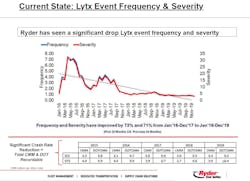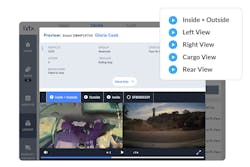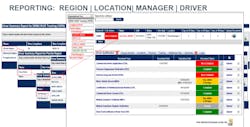Fleets use Lytx technology to increase positive driver behaviors
Driver safety is the motto of 2020, and fleets are focusing on what they can do to support safe driver behavior on the road and provide their drivers and fleet managers with the best resources to do so.
On Sept. 10, Ryder System Inc. (Ryder) and Vulcan Materials Co. (Vulcan) explained how their fleets utilize Lytx’s video monitoring software to observe driver behavior and uses that technology to make better hiring decisions.
In the FleetOwner webinar, Robert Prim, senior director of safety standards at Ryder, discussed the company’s history with Lytx software and how it’s used to monitor driver fatigue among the fleet.
“Our relationship with Lytx began in 2015,” Prim said. “We did a six-month evaluation of the Lytx system and felt like it met everything we were looking for. So we went for a full implementation and in 2017, moved it to our dedicated and supply chain [fleet] – about 4,500 vehicles.”
At the beginning of the rollout, Ryder experienced some pushback from its drivers. According to Prim, some drivers even threatened to quit.
“But we had less than 1% turnover over that rollout,” Prim stated. “We had driver safety meetings at every location before we installed and that worked out very well. By the end of our first year, our coaching effectiveness – a Lytx metric – was at 80%, which means that eight out of every 10 drivers coached would not repeat an unsafe behavior in the following 60 days.”
According to Ryder, the company’s driver event frequency and severity have improved by 73% and 71%, respectively, from 2017 to 2019 since implementing Lytx’s driver monitoring software. Prim stated that the company’s DOT reportable collisions statistics – defined as a fatality or injury away from work or a vehicle being towed – have been cut in half since starting the trial with Lytx.
One way that Lytx helps lower those reportable collisions numbers is by identifying driver fatigue.
When Lytx identifies a driver fatigue event, “we pull that driver off the road and we conduct a fatigue review,” Prim stated. “One of the things that we found out early on when we started conducting fatigue reviews was that our management team wanted to focus completely on rest. ‘What didn’t you do the night before? What did you do to get rest?’ And the reality of that is you can lay down, you can get rest, and you can still be tired the next day when you’re working a 14-hour day driving 11 hours.”
To overcome this realization, Ryder created a “Captain-The-Ship” policy, which allows the driver to pull over and take a break.
“A lot of our fatigue events occur when the driver has delivered to the last location, and they’re driving back home,” Prim continued. “Most of our drivers make multiple deliveries, and when they get to that farthest point, they drive back, and it’s during that drive back that we see most of our fatigue events. [This policy allows the driver to] take a little break to pull off, rest their eyes and be able to take a 15-minute power nap which gives them up to an additional two hours of rest.”
Andrew Leavitt, director of FMS Safety at Ryder, added insight on how using Lytx Compliance Services help the company’s drivers stay within federal regulations.
By using Lytx’s Compliance Dashboard, Ryder can identify the daily view of its current DOT compliance, hours of service (HOS) violation visibility, highest violations within HOS, stack rank locations to prioritize efforts, and address non-compliance and renewable items before being caught at the roadside.
Once the novel coronavirus pandemic hit the U.S., Prim added that there was concern about hiring new drivers and exposing them to the company’s certified driver trainers in the cab. To combat this new obstacle, Ryder came up with the “ride behind” examination.
“Our certified driver trainer would ride behind [the applicant during a test drive], but we have Lytx software in the cab,” Prim explained. Having the software in the cab during the examination allowed them to keep all of the driver information in one place.
That place being the Lytx Driver Qualification (DQ) File Management software. Each driver has a profile within this software, holding required documents such as:
- Commercial driver application
- Previous employment verification
- Previous drug and alcohol
- Motor vehicle record
- Certificate of violations/annual review
- Commercial driver’s license
- Medical examiners certificate
- Medical examiners registry verification
- Road test/Certificate of road test
- Limited Drug and Alcohol Clearinghouse verification
When a driver event happens, fleet managers can pull up a driver’s profile and find all accompanying documents that might be needed to assist during and after the event, Leavitt explained.
“Lytx Compliance Services provides peace of mind of having all electronic records in one place, but also the ability to quickly respond to audits, investigations, carrier reviews and also discovery if they were every to be pulled into a lawsuit,” Leavitt added.
Encouraging better behavior
Joshua Moore, logistics safety manager at Vulcan, discussed not only the practical uses of Lytx software for the company’s fleet, but also the positive ways it encourages driver behavior.
Vulcan is a major producer of construction materials such as asphalt and ready-mix concrete and uses multiple types of vehicles within its fleet, including mixers, flat-beds, dump trucks, pick-ups and tanker vehicles.
“We started with Lytx about five years ago and just focused on the exception-based reporting for incidents,” explained Moore. “Over the last couple of years, we’ve upgraded to the cameras with DVR capabilities. Once COVID-19 hit, we had to think creatively about how we could use the tools that we have at our disposal to make sure we continued our mission within our organization.”
According to Moore, the DVR capabilities can be used to ensure customer site conditions meet expectations while also resolving customer complaints. On the other side of that token, DVR capabilities provide an opportunity to capture additional footage to exonerate drivers when incidents arrive and praise them for previously unrecognized events.
“Lytx is a tool that provides you with a lot of data that you can use to capture those really positive things that drivers do every day that you would never hear about before,” Moore explained. “We had a driver that was operating on an interstate, a trailer became detached, running right beside his vehicle. He was able to safely maneuver his vehicle and avoid that trailer. We were able to take that and recognize that individual for their safe driving behavior.”
Throughout the COVID-19 pandemic, truck drivers have been recognized more and more for the service they provide to the nation’s economy. According to Moore, Lytx’s DVR capabilities allow fleets to continue that encouragement.
“The drivers do so much good every day in such challenging conditions. With Lytx, you’re able to see that and possibly recognize folks for a job well done.”
About the Author
Catharine Conway
Digital Editor
Catharine Conway is a past FleetOwner digital editor who wrote for the publication from 2018 to 2022.




